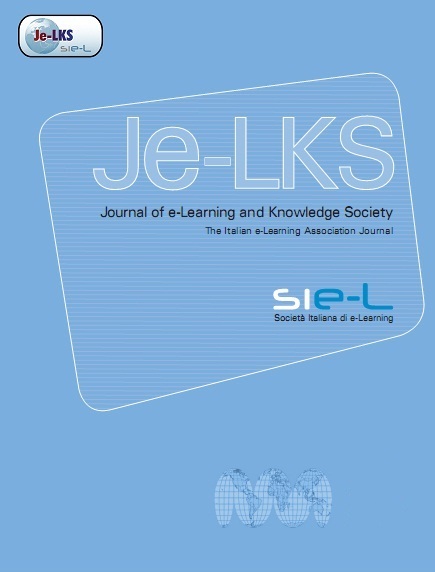An issue of Journal of e-Learning and Knowledge Society has just been added to EdITLib.
The table of contents is available here: http://www.editlib.org/j/JELKS/v/11/n/3//
Contents
Applying gamification techniques to enhance effectiveness of video-lessons
Mauro Coccoli, Saverio Iacono & Gianni Vercelli
Gamification techniques are commonly used in e-learning to enhance the effectiveness of educational activities and the learners’ partaking. In fact, owing to the engagement effect, they can improve learning processes … More
Determinants of digital inequality in universities: the case of Ecuador
Juan Torres-Diaz & Josep Duart
The digital divide was initially defined by socioeconomic variables, mainly the level of family income, but now it focuses on how the Internet is used and is called digital inequality. … More
Gamification and learning: a review of issues and research
Filomena Faiella & Maria Ricciardi
This paper will review the literature on gamification and aim to apply principles of analysis for synthesize existing research, identify issues of controversy, uncover areas that future gamification research should … More
The design and implementation of a gamified assessment
Selay Arkn Kocadere & Şeyma Çağlar
In this research, a gamified assessment was designed considering the theoretical basis and implemented. The dynamics, mechanics and components that Werbach & Hunter (2012) defined for gamification, used in the … More
Beating the Odds: Teaching Italian online in the Community College Environment
Giulia Guarnieri
This study analyzes data collected from Italian language online classes during the course of four consecutive semesters at Bronx Community College in order to measure the impact that distance learning … More
Social, constructivist and informal learning processes: together on the Edge for designing digital game-based learning environments
Gianvito D'Aprile, Pierpaolo Di Bitonto, Roberta De Asmundis & Antonio Ulloa Severino
The theoretical conceptions of game-based learning are different from those of traditional instruction. Indeed, the classical approaches of needs and task analysis seem to be not appropriate for designing digital … More
Employing game analytics techniques in the psychometric measurement of game-based assessments with dynamic content
Yasser Jaffal & Dieter Wloka
The adaptation Game-Based Assessment (GBA) (Mislevy et al., 2014) has been growing in the last years backed by video games’ capability of offering a task model to assess learners’ complex … More
Measuring Learner’s Subject Specific Knowledge
John Girard, Tina Ashford & Pedro Coln
This was the second phase in a research project designed to compare student achievement in online and face-to-face classes. The aim of this phase was to determine if online and … More
Evaluations to the gamification effectiveness of digital game-based adventure education course — GILT
Chang-Hsin Lin & Ju-Ling Shih
This study aimed to design a digital game-based adventure education (GILT) course for team-building purposes. The six traditional activities chose from adventure education were developed into six digital games and … More
Knowledge-based assessment in serious games: an experience on emergency training
Nicola Capuano & Richard King
Emergency preparedness is a promising application field for digital serious games enabling the simulation of real emergency scenarios and allowing a high learning transfer thanks to engagement and focus on … More
ACT – A new game-based methodology for Anti-Corruption Training
Vincenzo Petruzzi & Marco Amicucci
Corruption is a powerful impediment to economic and social evolution, and training is one of the most important tools for helping organisations stem and combat the spread of this phenomenon. … More
Serious games design: A mapping of the problems novice game designers experience in designing games
Sevasti Theodosiou & Ilias Karasavvidis
One of the main problems the field of Serious Game Design is facing concerns the gap between game design and educational design. It has become evident that to optimize the … More

